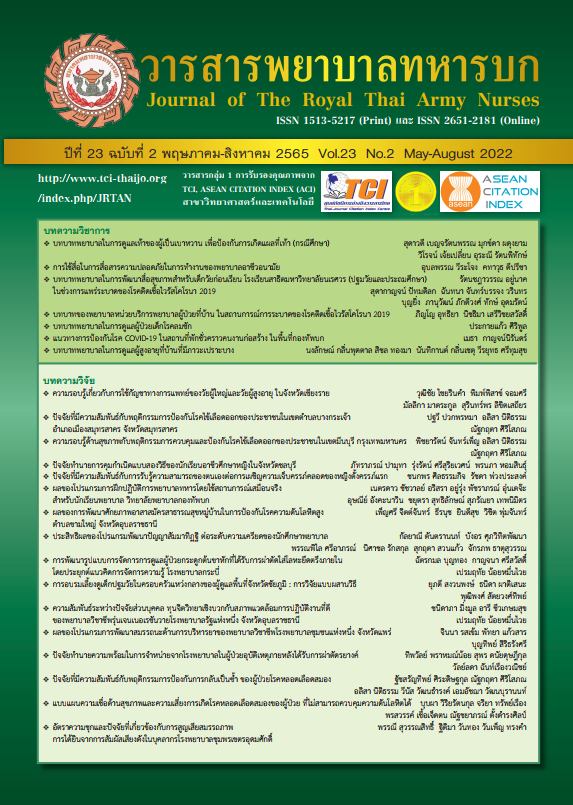The Effects of a Program to Develop Competency in Drug Administration for Registered Nurses in a Community Hospital, Phrae Province
Keywords:
Competency in Drug administration, Registered nurse, Community HospitalAbstract
This was a quasi - experimental research (pre-and post-program tests were administered to the same group of samples) with the objective of comparing the pre-and post-program drug administration competency of registered nurses at a community hospital in Phrae Province in the areas of 1) knowledge; 2) skills; and 3) attitude. The sample population, chosen through purposive sampling, consisted of 50 registered nurses with at least one year of work experiences. The research tool was a program to develop competency in drug administration for registered nurses. An evaluation form to measure the samples’ self-reported levels of knowledge, skill and attitude about drug administration before and after the program. The content validity index of the tool was rated at .92 and the reliability was .70 when measured by Kuder-Richardson Formula 20. Personal data of the samples were analyzed by descriptive statistics and paired t-test.
The results showed that the mean post-program scores for competency in drug administration in terms of 1) knowledge; 2) skill; and 3) attitude were higher than the mean pre-program scores to a statistically significant degree (p<.05).The research results should be used for planning the development of professional nursing personnel. In order to enhance drug administration competency to increase.
Downloads
References
McClelland D. C. Test for Competency rather than intelligence. American Psychologists. 1970; 17: 57-83.
Senadisai S, Prapaipanich W. Basic Nursing. Bangkok: Judthong Company Limited; 2015. (in Thai).
World Health Organization. Medication Errors: Technical Series on Safer Primary Care. Switzerland: World Health Organization; 2016.
Feleke SA, Mulatu MA, Yesmaw YS. Medication administration error: magnitude and associated factors among nurses in Ethiopia. BMC Nurs. 2015; 14: 53.
Shitu Z., Aung MMT, Tuan Kamauzaman TH. Ab Rahman AF. Prevalence and characteristics of medication errors at an emergency department of a teaching hospital in Malaysia. BMC Health Service Research. 2020; 20: 56.
Limpanyalert P. 2P safety patient and personnel safety. Northeast Reginal HA Forum 4thed; 2017 Jul 18. Pullman KhonKaen Raja Orchid Hotel. KhonKaen, 2017.(in Thai).
Cheevakasemsook A. New Clinical Nursing Supervision with 2P Safety: Concept and Application. Journal of The Royal Thai Army Nurses. 2020; 21(2): 9-17. (in Thai).
NCC MERP. NCC MERP Index for Categorizing Medication Errors. 2001 (copy).
Supachutikun A. HA Update 2014. Nonthaburi: Healthcare Accreditation Institute (Public Organization); 2014. (in Thai).
Healthcare Accreditation Institute (Public Organization). National Reporting and Learning System: NRLS. Nonthaburi: Healthcare Accreditation Institute (Public Organization); 2017: 13. (in Thai).
Fukul A, Pimwapee J, Buttura M. Factors related to drug administration error of registered nurses at Lampang Cancer Hospital. Journal of Medical Studies Region 11. 2013; (7) 2: 253 - 260. (in Thai).
Homnium N, Ratchachukul S. The effects of developing administered medicines using empirical evidence on the incidence of drug tolerance and job satisfaction of critical care ward professional nurses. Journal of Nursing Science ChulalongkornUniversity . 2016; 28 (1): 139-150. (in Thai).
Risk management team. Report of Incidence of Medication Error 2017- 2019. A Community Hospital, Phrae Province, 2017- 2019. (in Thai).
PCT team. Clinical Risk Review Meeting Minutes November 2018. Community hospital, Phrae Province, 2018. (in Thai).
Boyle, Patrick G. Planning Better Program. New York: Mc Graw Hill Book Company; 1981.
Bord Altranaisagus Cnáimhseachaisnah Éireann Nursing and Midwifery Board of Ireland. Standards for Registered Nurses and Midwives on Medication Administration (2018) DRAFT. Ireland; 2018.
Community Practice Nursing Faculty of Nursing SongkhlaNakarin University. Handbook for teaching the principles of rational drug use Course in Community Health Nursing and Initial Disease Treatment (640-493). Songkhla Province, 2018.(in Thai).
Khaemmanee T. Teaching and learning styles: various options. 17thed. Bangkok: Active Print; 2013. (in Thai).
Benjamin B. Taxonomy of Education Objectives Handbook I: Cognitive Domain. New York: David McKay Company. Inc; 1956.
Bloom BS. Handbook on formation and Summative Evaluation of Student Learning. New York: McGraw-Hill Book Company; 1971.
Kalaka S, Chantra R, Sarakstrin A, Thanaroj S, Saojawutipong W. The Effects of Using a Video Shadow Puppet Troupe and Self-care Manual on Knowledge and Self-care behavior of Persons with Type 2 Diabetes Mellitus. Nursing Journal of the Ministry of Public Health. 2019; 146-156. (in Thai).
Konbun R, PangprasertK , Siriwat W, Nachaiyaphum J. The guidelines on development of learning achievement of nursing students in maternal and newborn nursing and midwifery 2, College of Asia Scholars. Journal of the Asian Graduate School. 2020; 10(1): 147-155. (in Thai).
Suworawatanakul W, Nartchamnong S, Leaungsomnapa Y. The Effects of Developing Reflective Thinking Skills and Levels of Reflection Using Reflective Thinking Learning Program on Nursing Student, Boromarajonani College of Nursing Changwat Nonthaburi. Journal of Phrapokklao Nursing College.2016; 27(1): 61-71. (in Thai).
Downloads
Published
How to Cite
Issue
Section
License
Copyright (c) 2022 Journal of The Royal Thai Army Nurses

This work is licensed under a Creative Commons Attribution-NonCommercial-NoDerivatives 4.0 International License.
บทความหรือข้อคิดเห็นใดใดที่ปรากฏในวารสารพยาบาลทหารบกเป็นวรรณกรรมของผู้เขียน ซึ่งบรรณาธิการหรือสมาคมพยาบาลทหารบก ไม่จำเป็นต้องเห็นด้วย
บทความที่ได้รับการตีพิมพ์เป็นลิขสิทธิ์ของวารสารพยาบาลทหารบก
The ideas and opinions expressed in the Journal of The Royal Thai Army Nurses are those of the authors and not necessarily those
of the editor or Royal Thai Army Nurses Association.






